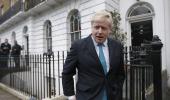Prime Minister Narendra Modi and his visiting British counterpart Boris Johnson on Friday held extensive talks with an aim to further expand cooperation in areas of defence, trade and clean energy.

Ahead of the talks, the United Kingdom said it will offer India the best of British know-how on building battle-winning aircraft and support the country's requirements for new technology to respond to threats in the Indian Ocean.
In a statement, the British high commission said the UK will issue an Open General Export Licence to India to cut the delivery period for defence procurement.
The British prime minister arrived in India on Thursday on a two-day visit in the backdrop of the Russia-Ukraine war.
"The world faces growing threats from autocratic states which seek to undermine democracy, choke off free and fair trade and trample on sovereignty.
The UK's partnership with India is a beacon in these stormy seas," Johnson was quoted as saying by the high commission.

"Our collaboration on the issues that matter to both our countries, from climate change to energy security and defence, is of vital importance as we look to the future," he said.
In a tweet, Johnson said he was looking forward to meeting Modi.
"Wonderful to see you, my friend PM @BorisJohnson in India on a long-awaited visit. Look forward to our discussions today," Modi said in a tweet in his response.
Earlier, External Affairs Minister S Jaishankar called on Johnson.
"Delighted to call on UK PM @BorisJohnson during his India visit. Discussed our expanding partnership and implementing the #IndiaUK Roadmap 2030," Jaishankar tweeted.

In its statement, the high commission said Johnson will also discuss with Modi new cooperation on clean and renewable energy aimed at supporting New Delhi's energy transition away from imported oil.
The India-UK relationship was elevated to a Comprehensive Strategic Partnership during the India-UK virtual summit held between Modi and Johnson in May last year.
At the summit, the two sides adopted a 10-year-roadmap to expand ties in the key areas of trade and economy, defence and security, climate change and people-to-people connections among others.










